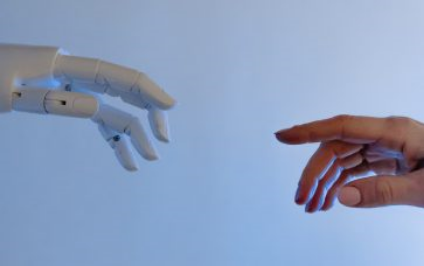On August 30, Thursday, Mike Mayo appeared on Bloomberg TV to discuss something that had caused global outrage. The managing director and veteran equity analyst of Wells Fargo & Co. collaborated with his team of analysts in a study to understand the impact of technology on banking. The result was a 110-page report, sent to the bank’s clients on Monday, concluding that automation could cut around 100,000 banking jobs over the next five years. “Developers are the new bankers,” Mayo told Bloomberg.
The fact that technology has disrupted an industry in 2021 is not a surprise. The fact that the disruption hit banking now is. Banking has bureaucratic roots and is universally infamous for mounting paperwork, long queues, and beige walls. The pandemic has shown that all three are unnecessary. Digital banking is ridiculously more convenient, allowing customers to bank without leaving their homes.
Banking is not the first industry conquered by technology, and certainly will not be the last. History offers confirmation. In the 18th century, 98% of Americans were employed by agriculture. Today that figure stands at over 2%. Indeed, the disruption pushed the next generation toward factories and manufacturing. Decades later, the jobs are about to suffer an identical fate. And finally, in the era of Big Data and Artificial Intelligence, the service sector is next.
Or is it?
Yes, robotics is flourishing, and McKinsey estimates that over 50% of today’s work could be automated by 2025. But McKinsey, as does Wells Fargo, adds that two-thirds of those jobs are repetitive and demand basic cognition.
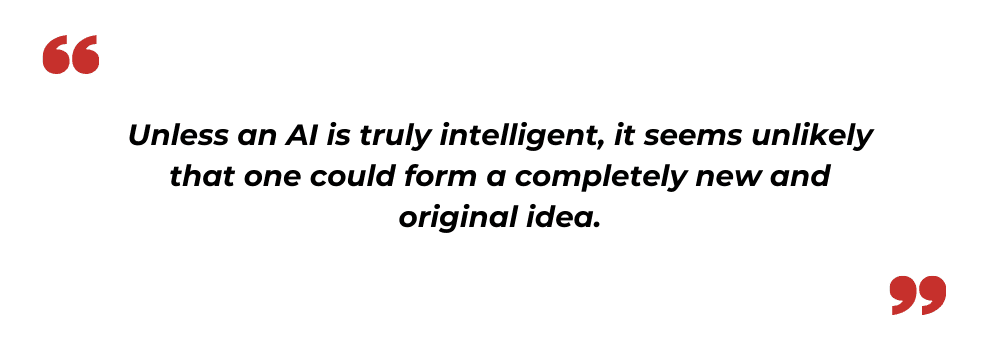
Such jobs occupy every industry, from retail and healthcare to education and media & entertainment. In the case of banking, Mayo emphasized that the jobs most likely to be displaced would lie in back-end operations like data entry, for instance. The remaining one-third of jobs are slightly less repetitive and more complex, but not complex enough for the AIs of the near future. A self-driving vehicle comes to mind.
What about the other 50%? The jobs that would not be automated. Indeed, many of them would be jobs that cannot be automated.
The jobs that are safe from AI and automation
As Artificial Intelligence becomes more advanced, its scope of intelligence expands. As the scope expands, the range of tasks it can accomplish increases.
Matching words, for example, to validate customers is simple and can be easily automated. That’s because the rules involved in the process are fairly low. On the other extreme is having a full-fledged conversation with customers, fully aware of cultural nuances and context.
That’s a remote possibility, but a possibility nonetheless. The question is, do we want the possibility to become a reality? Do we want robots to sell us products and services, even though the robots sound and seem authentically human? To sell soap, yes. To sell insurance and houses? Probably not.
Here are the jobs that, according to HubSpot, would be automated in the coming decades.
- Telemarketing
- Bookkeeping
- Receptionists
- Couriers
- Proofreading
- IT specialists
- Market research
- Retail
It is clear that jobs that are either rule-based or don’t need a deep human connection are most likely to be automated. In contrast, here are jobs that are not rule-based and demand a deep human connection.
- HR
- Writing and editing
- Teaching
- PR
- Sales and marketing managers
- Chief executives
- Software developers
- Graphic design
- Judiciary
- Event planning
The work these professionals engage in is context-heavy and strategic. Now, to be fair, their work, too, is rule-based. All work is. But their rules are far too many for AIs today.
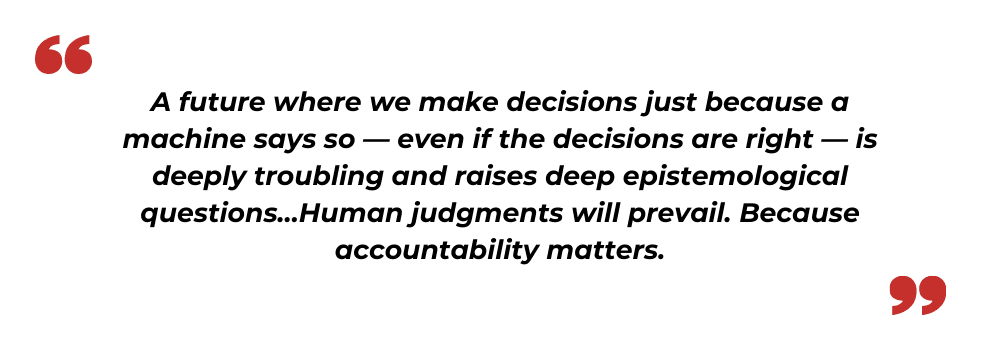
We could come across a market strategy or movie script entirely developed by a strong AI in the future. Such an AI, as we explained, would be capable of crunching massive and highly complex datasets to understand, emulate, and predict human expression and responses in all their nuance and context.
But, intuitively, when we learn that the intelligence producing the ideas and responses is artificial, they lose their authenticity. Especially, if it is a verdict given by an AI-based judge. Even if the decision turns out to be right.
The most in-demand quality in the Age of AI would be authenticity — the quality that differentiates human intelligence from artificial intelligence. And what skills are authentically human?
The skills that AI won’t replace
The skills that are most likely to survive are “soft.”
1. Empathy
A few hundred bots may replace 100,000 bankers, but bots cannot empathize with customers who wish to take out a loan for buying a house or starting a business. Nor can they address the emotional needs of customers who fall prey to fraud.
Empathy, of course, goes beyond customer service. It applies to any interaction that demands we deeply connect with and feel what the other person is feeling. Could you bear being consoled by an AI nurse or doctor?
Read more: The 7 Biggest Technology Trends In 2022
In fact, empathy is not just about words, but also a subtle modulation of tone and body language. And who understands this better than managers? In 2025 or 2050, as long as human beings lead and manage other human beings, empathy will remain a must-have in the market.
2. Accountability
An AI can make judgments all right. But only rational judgments such as making very accurate investment decisions and forecasting sales and marketing numbers.
Actually, AI can also make emotional or irrational judgments. Indeed, predicting human behavior is the bread and butter of Facebook and Google. Advertisers use the data to target us with their products and services. And given how highly valued the two are, the predictions seem to have been accurate.
Here’s the problem: the algorithms in circulation today employ several hundred factors to interpret and predict human behavior. Their work is admittedly so complex and intricate that even their developers don’t understand how the algorithms arrive at their insights.
Google and Facebook have been constantly condemned for delivering results that are biased against minorities. Queries for “ugly” and “poor,” for example, often return results that include people of color.
Read more: Building a Robust ESG Reporting Framework With Intelligent Automation
However, the stakes are relatively low here. Instead, imagine using an AI to assess and hire people. Or worse, convict or acquit people. Not only will the verdict be as good as the data fed to the AI, but being a black box, we would be unable to decode how it arrived at the decision it did.
A future where we make decisions just because a machine says so — even if the decisions are right — is deeply troubling and raises deep epistemological questions. Making investment decisions is worrisome. Delivering a verdict is downright unethical. Human judgments will prevail. Because accountability matters.
3. Innovation
In a nutshell, creativity is the capacity for connecting two different ideas. We see this in metaphors, such as when Shakespeare compared life to a play. And in problem-solving, such as when advertisers connect products with personalities to make them more attractive.
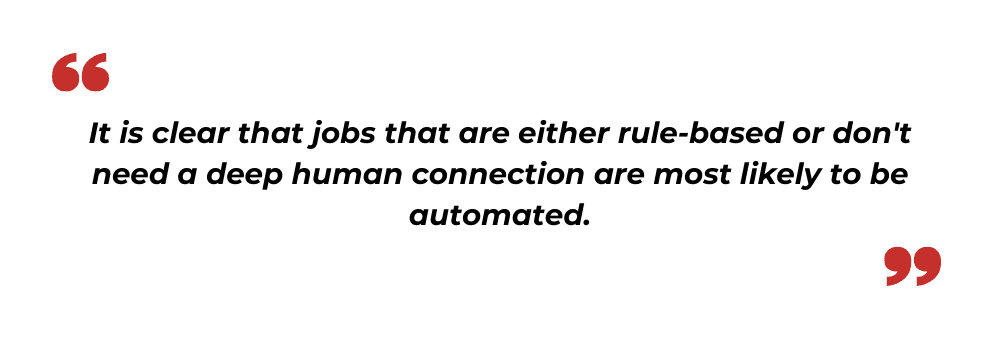
Could an AI automate creativity? Yes and no.
In the future, a powerful AI could very well come up with effective sales and marketing strategies. But could it come up with the actual material or content that would persuade consumers to become customers? Probably not.
Read more: A Post-Pandemic Business Strategy? Here Are 4 Things to Remember
Unless an AI is truly intelligent, it seems unlikely that one could form a completely new and original idea. AIs work within limited datasets and pre-defined algorithms. Those algorithms may have two steps or two billion, depending on how advanced the AI is. The AI may also be self-learning, but it still is confined to making inferences within its pre-defined dataset.
To human beings, creativity is unique and innate. We are born to think outside the box.
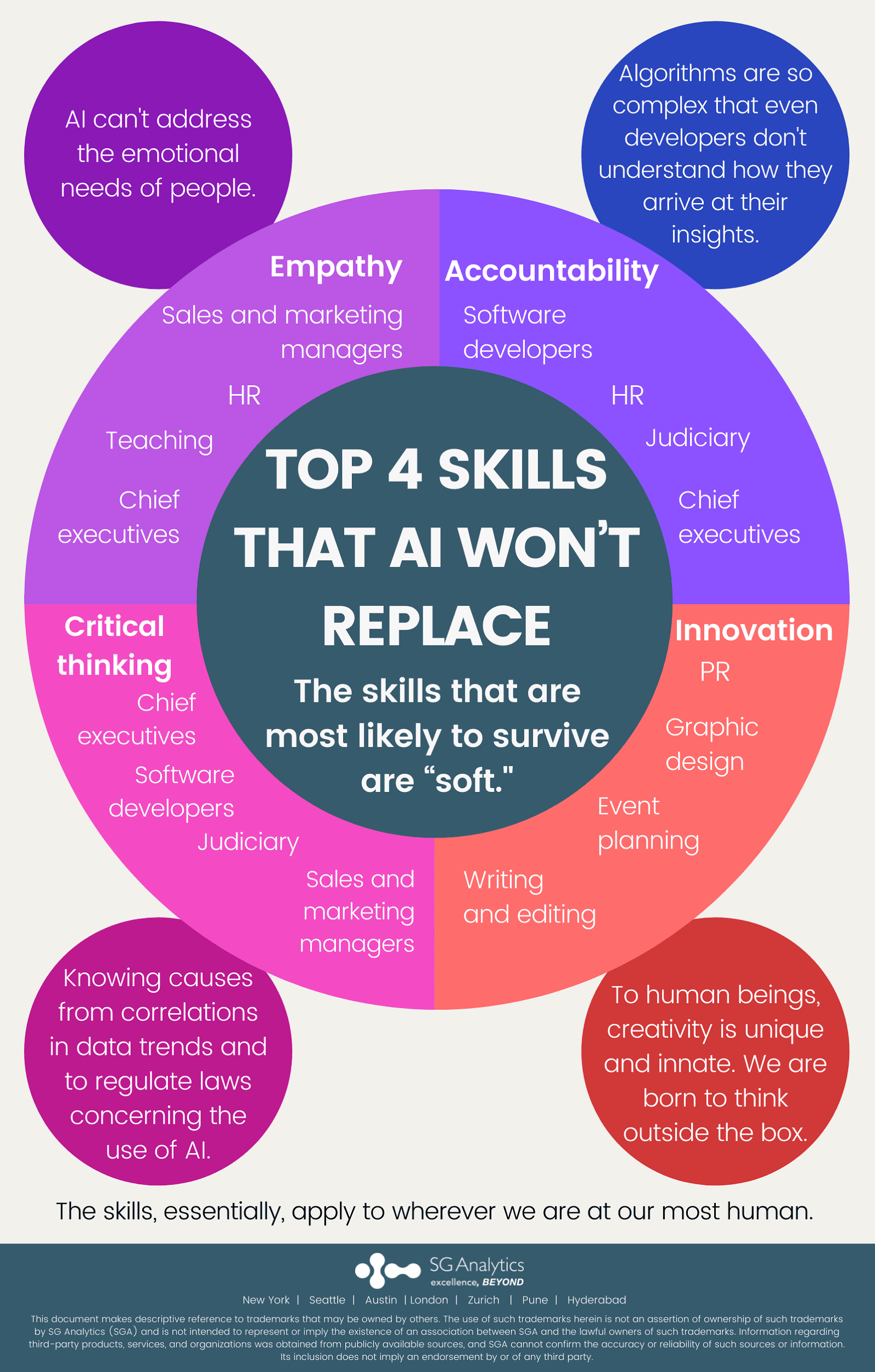
4. Critical thinking
Critical thinking is fundamental to accountability and, in a way, creativity. As a skill, critical thinking is evergreen. However, in a technology-enabled future, it is a must-have for two primary reasons.
- To know causes from correlations in data trends. The capacity for identifying the difference will become harder and harder to cultivate as datasets become more and more complex. The capacity will also require technical know-how. In any case, the point is that critical thinking will enable us to reverse engineer decisions made by AIs.
- To regulate laws concerning the use of AI. Here is where critical thinking and creativity combine. Given we have the appropriate level of technical knowledge, creativity allows us to determine the cross-functional impact of AI. Here we bring multiple disciplines together, say, when we study the use of AI on employee well-being.
It must be noted that the four skills do not apply to just the ten jobs listed above. The skills apply to HR, sales, and marketing managers, yes, but also to judges and teachers and wherever we are at our most human.
Read more: Could ‘Stablecoin’ Save the Future of Digital Currency?
The AI revolution, like the industrial revolution, has its challenges and is rightfully dreaded by many. But there is also plenty to look forward to. As Kai-Fu Lee has remarked, “AI is serendipity. It is here to liberate us from routine jobs, and it is here to remind us what it is that makes us human.”
With offices in New York, Austin, Seattle, London, Zurich, Pune, and Hyderabad, SG Analytics is a leading research and analytics company that provides tailor-made services to enterprises worldwide. If you’re looking to make critical data-driven decisions, decisions that enable accelerated growth and breakthrough performance, contact us today.


